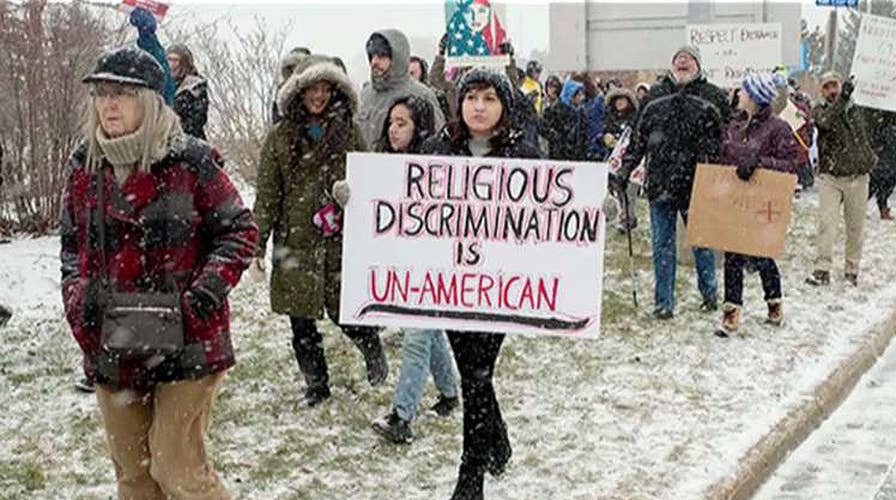Federal judge puts Trump's revised travel ban on hold
Hawaii judge issues temporary restraining order
A lone Hawaii Federal judge has ruled that President Trump’s anti-terror executive order is unconstitutional – and blocked it. The notion is that, since it applies to majority Muslim countries, and an Egyptian imam with American citizenship has a Syrian mother-in-law who would be affected, the order violates the First Amendment’s “no establishment” clause. The court’s reasoning is contorted. Worse, the ruling sets a dangerous precedent.
Never mind that the asserted injury is intangible, attenuated and hard to conceive, and that the object of this temporary visa delay is a non-American who hails from a country suffused with terror. Never mind that the First Amendment’s “no establishment” and “free exercise” clauses apply to Americans.
Never mind the bold imputation of bad faith to a sitting President of the United States, along with his Secretaries of Homeland Security, State, Defense and Attorney General. Never mind supposition that the countries to which the restriction applies were identified by the prior administration as “countries of concern,” each warranting extra caution.
All of this is of no matter. Instead, waving the wand of judicial activism, the judge gave his ruling national effect. More, he declared the “illogic of the Government’s contentions… palpable.” If that is not contempt by a judge, and Obama appointee, for the Executive Branch, one is hard pressed to imagine what contempt looks like.
Despite this ill-advised ruling and juridical hubris, the Ninth Circuit US Court of Appeals will likely to uphold the lower court. This is not because the lower court is correct, but because that misguided Circuit – of which Hawaii is a part – has become a bastion of unelected, unaccountable, unrestrained redefinition of the Constitution in their own activist image.
Notorious for judicial overreach and eye-popping inferences, this ruling goes further. It not only shows disregard for strict construction of the Constitution’s words, betrayal of textual fidelity, as well as of original intent and judicial restraint. It does more.
This judge – and likely the Ninth Circuit – seems prepared to assume not just power to “say what the law is,” but power to “say what national security is.” In doing so, the Court and Circuit upend the considered judgments of two administrations and Congress as to countries presenting undue risk to America – and requiring more intense vetting.
The irony is that none of these esteemed judges, arrogating to themselves this national security power, appear to have any experience vetting foreign nationals who possess no documentation and emerge from a country internationally recognized as a terrorist haven. The sheer scope of the judicial arrogation is breathtaking.
As a former Assistant Secretary of State for a chiefly functional bureau, part of my assigned job was to assist military and civilian discussions, assessments, and implementation of screening or so-called vetting of foreign nationals in certain parts of the world to become police officers, including in Iraq.
These individuals often had no written records. They came from war-torn sub-regions of Iraq. Their past lives were material to judging whether they could be trusted. Their life stories were complicated, hard to disentangle, corroborate and confirm. Nevertheless, doing that was essential. How much more essential if they were coming to the United States?
These facts affected the level of trust with which individuals could be invested. A wide range of questions, including personal, family, tribal and professional affiliations were relevant. In sum, vetting those emerging from war-torn, terror-infested countries is inordinately hard and takes time.
No matter. Watch what is about to happen. Judicial activism will hold sway. By hold sway, I mean that – until we have a fully loaded Supreme Court bench – the Ninth Circuit will be allowed to place the Nation at risk by assuming to itself this national security power. Objectively, that usurpation of Executive Branch power seems dangerous.
Historically, I cannot think of a similar period in which the external threats to our national security, level of popular concern about security, and basis for both assessments were as high, and yet judicial temperament so out of sync with core realities and established institutional prerogatives.
I could be wrong of course. The Ninth Circuit may surprise me. They may recognize the President’s inherent authority, narrowed anti-terror travel order, nonsensical nature of blocking a national security order on grounds of religious demography. They may reverse. If so, I will be surprised. So far, the circuit has disappointed constitutional scholars and security experts.
U.S. District Court Judge Derrick Watson gives Hawaii and the Muslim leader "a strong likelihood of success on their claim" that our President crafted the order not to secure America from the growing international terrorist threat, but strictly from religious animus. How long will this fiction go on?
This produces my own simple prayer: May the Supreme Court bench be complete soon, may no terrorist attack occur between now and that time, and may respect for the Founder’s wisdom and Article II one day return to the Ninth Circuit. On reflection, that seems not too much to ask.









































